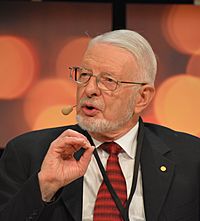Daniel McFadden facts for kids
Quick facts for kids
Daniel McFadden
|
|
|---|---|

McFadden in 2014
|
|
| Born | July 29, 1937 Raleigh, North Carolina, U.S.
|
| Nationality | American |
| Alma mater | University of Minnesota |
| Known for | Discrete choice |
| Awards | John Bates Clark Medal (1975) Frisch Medal (1986) Erwin Plein Nemmers Prize in Economics (2000) Nobel Memorial Prize in Economic Sciences (2000) |
| Scientific career | |
| Fields | Econometrics |
| Institutions | University of California, Berkeley Massachusetts Institute of Technology University of Southern California University of Chicago |
| Doctoral advisor | Leonid Hurwicz |
| Doctoral students |
|
| Scientific career | |
| Thesis | Factor Substitution in the Economic Analysis of Production (1962) |
Daniel Little McFadden, born on July 29, 1937, is a famous American economist. He is known for his work in econometrics, which uses math and statistics to study economic data. In 2000, he won the Nobel Memorial Prize in Economic Sciences. He shared this big award with James Heckman.
McFadden received his part of the prize for creating new ways to understand "discrete choice." This means studying how people choose between different options, like choosing a car or a place to live. He is currently a professor at the University of Southern California and the University of California, Berkeley.
Contents
Early Life and Education
Daniel McFadden was born in Raleigh, North Carolina, on July 29, 1937. He went to the University of Minnesota for his college studies. There, he earned a degree in Physics.
Five years later, in 1962, he earned his Ph.D. in Behavioral Science, focusing on Economics. His professor at the University of Minnesota was Leonid Hurwicz. Hurwicz also won the Nobel Prize in Economics in 2007.
Daniel McFadden's Career
In 1964, McFadden started working at the University of California, Berkeley. His research focused on how people make choices. He also studied how to connect economic ideas with real-world measurements.
In 1974, he introduced a new method called conditional logit analysis. This method helps economists understand choices better.
Awards and Recognition
McFadden received the John Bates Clark Medal in 1975. This award is given to an American economist under 40 who has made important contributions. In 1977, he moved to the Massachusetts Institute of Technology.
He was chosen to be a member of the United States National Academy of Sciences in 1981. This is a very high honor for scientists in the U.S.
Return to Berkeley and Later Work
In 1991, Daniel McFadden returned to the University of California, Berkeley. He started the Econometrics Laboratory there. This lab uses computers and statistics to solve economic problems.
He is also a leader for a group called Economists for Peace and Security. In 2000, he won the Erwin Plein Nemmers Prize in Economics. He was also elected to the American Philosophical Society in 2006.
In January 2011, McFadden became a special professor at the University of Southern California (USC). He teaches economics and public policy there.
Views on Economic Policy
In June 2024, Daniel McFadden joined 15 other Nobel Prize winners in Economics. They signed an open letter about economic policies. They shared their concerns about certain financial and trade plans. They also discussed keeping the Federal Reserve independent.
See also
 In Spanish: Daniel McFadden para niños
In Spanish: Daniel McFadden para niños
- List of economists
 | Sharif Bey |
 | Hale Woodruff |
 | Richmond Barthé |
 | Purvis Young |

